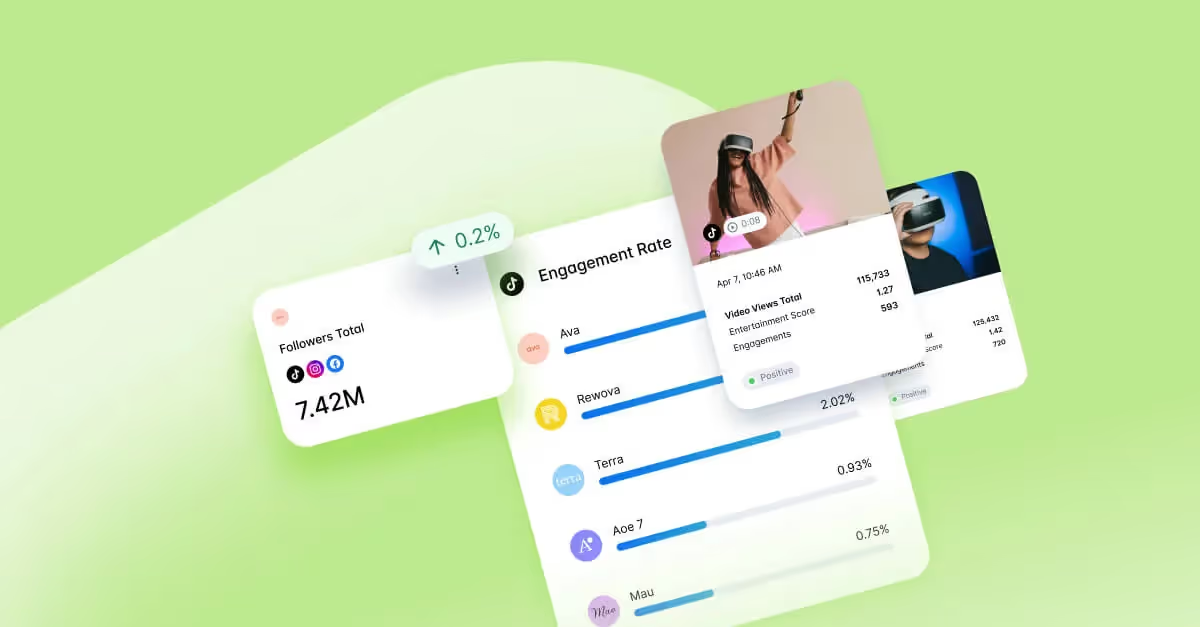10 Travel Marketing Tips for Success in 2025
Drive users to exciting destinations with our travel marketing tips.
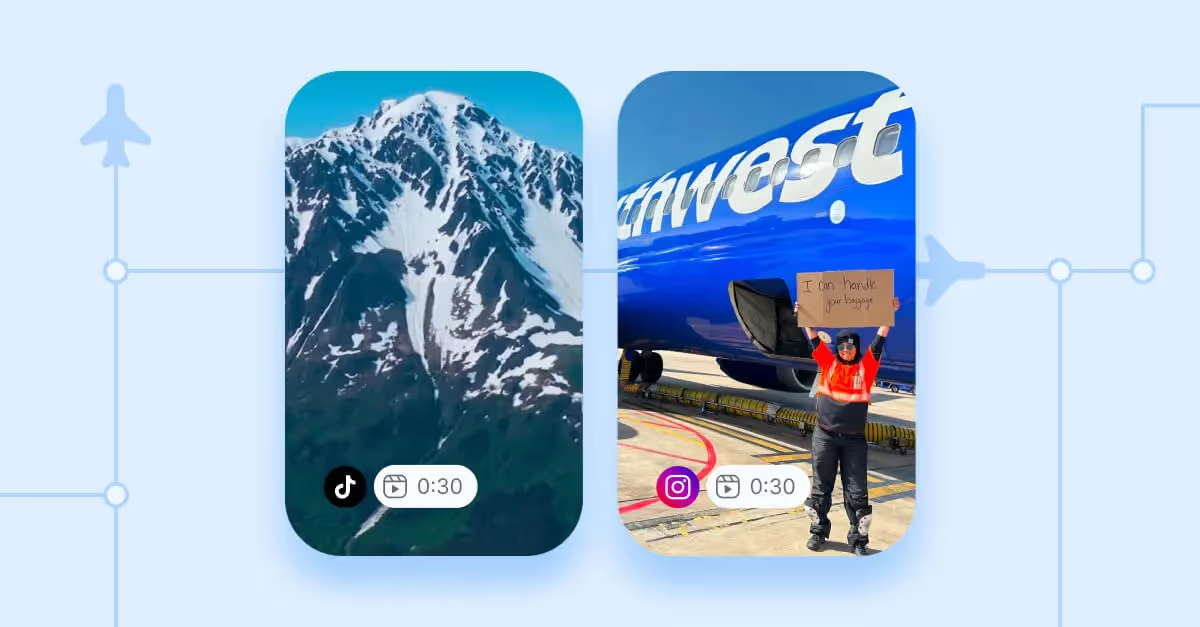
The travel industry is far-reaching and involves all aspects of tourist experiences, including airfare, resorts, hotels, experiences and even local businesses. Although it is difficult to define the economic impact of travel, it is estimated to contribute 5.8 billion dollars to the global GDP.
Travel is more than a lucrative business function — it’s a core component of countries’ economic playbooks. Needless to say, marketing for the travel industry is particularly important, as it leads to localized economic growth.
What Is Travel Marketing?
Simply put, marketing in the travel and tourism industry is about motivating people to travel. Several sectors are involved in tourism marketing and each has its own way of reaching potential customers. Resorts, for example, have different social media marketing strategies than car rentals and airlines have different marketing strategies than cruises. Each segment shares the common thread of empowering customers to have fulfilling experiences.
As travel is a traditional market, it is not limited to just online channels to reach potential customers — it is a mainstay in television commercials, radio ads, out-of-home advertising, pop-up events and more.
Online, brands use a mixture of social media, email marketing and paid social advertising to reach potential customers. No matter what channel you choose to market on, what’s important is to understand your target demographic and what motivates them to travel.
Why Is Travel Marketing Important?
Travel marketing is essential because it connects destinations with travelers, bridging the gap between inspiration and action. Despite spending less on advertising than industries like retail or entertainment, travel companies are projected to spend $10.34 billion on media advertising in 2025, an increase from the $9.86 billion spent in 2024.
Travel brands prioritize search ads over display, leveraging consumer intent as travelers often perform numerous searches before finalizing plans. While the industry spends less on social and mobile advertising, focusing just 15.8% of its digital marketing budget on these channels, organic social media has become more important in driving brand awareness and building a community.
Best Travel Brands on Instagram
Dash Social analyzed hundreds of travel companies for the latest Social Media Trends Report on Instagram (and TikTok) to determine which were most successful based on engagement rate.
Across the top three travel brands on Instagram, one thing is clear: each leverages storytelling to highlight the unique appeal of its offering. It uses a mix of lo-fi and hi-fi visuals, relatability and creator collaborations to give travelers a glimpse at what their experience could be.
Morey’s Piers (@moreyspiers)
- Average overall engagement rate: 1.4%
- Average engagement rate — static & carousel: 1.4%
Morey’s Piers feed taps into a variety of content from trending memes for relevant holidays like their recent take on the Valentine’s trend, to visuals of their staff and customers enjoying roller coasters, the boardwalk and every other amenity Morey’s Pier has to offer. They tap into storytelling in their posts, both from their staff and customers to humanize its attractions and the overall ‘Morey’s Pier’ experience.
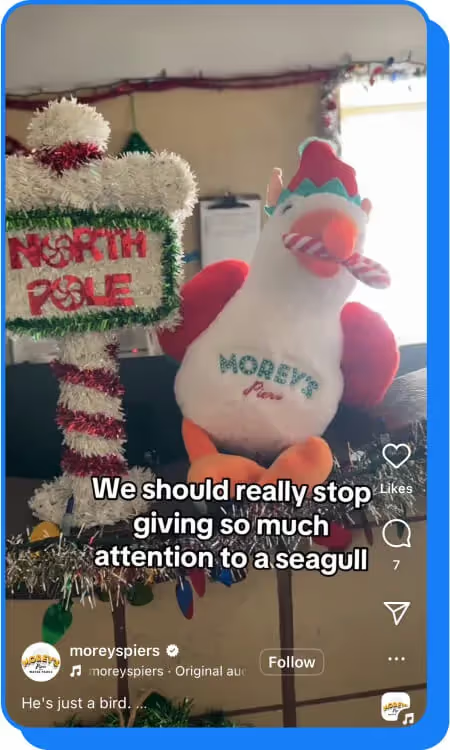
Southwest Airlines (@southwestair)
- Average overall engagement rate: 1.2%
- Average engagement rate — static & carousel: 0.7%
Southwest Airlines does a phenomenal job of promoting its in-flight experience, by sharing fun extras like their Puppy Bowl experience (who wouldn’t want to cuddle a sweet puppy upon landing?) and Reels about unusual items you can check, like sauce — yes, sauce. In addition to this content, Southwest does a superb job of crafting ultra-relevant memes that display its brand identity as fun, helpful and ready to laugh.
Like Morey’s Pier, they also use social content to humanize its staff, putting friendly faces behind the people that make your flight happen. From engagements to a sneak peak at the engineers who work on planes, this storytelling approach helps users relate to the brand.
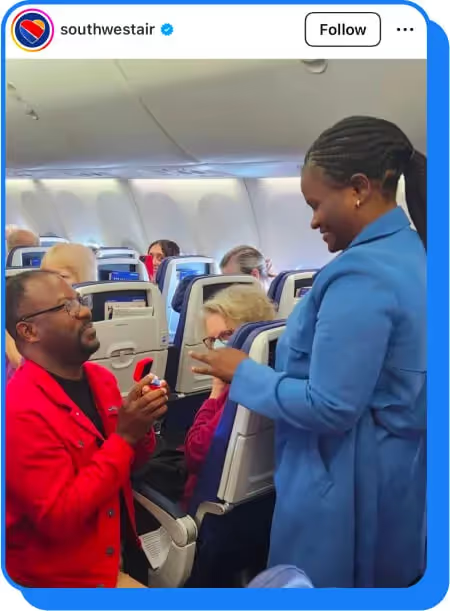
Disney Parks (@disneyparks)
- Average overall engagement rate: 1%
- Average engagement rate — static & carousel: 1.1%
Disney Parks leverage nearly every aspect of the Disney experience to both entice users to its attractions but also connect with them on an emotional level, with content showing children meeting their idols and NFL players enjoying the park. Rather than tapping into memes, they tap into other trends like collaborations centered around ‘snack challenges’ aimed at promoting the large range of delicious snacks available at its parks, and the search for the best pair of mouse ears.
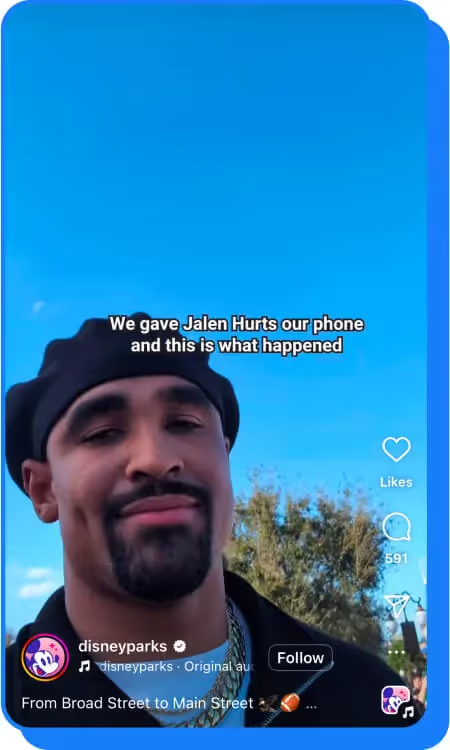
Best Travel Brands on TikTok
Along with analyzing Instagram's top brands, Dash Social analyzed hundreds of travel companies on TikTok to determine which were most successful based on engagement rate.
Southwest Air (@southwestair)
- Average engagement rate: 8.0%
- Average video views: 322.5K
Similar to its approach on Instagram, Southwest uses its TikTok presence to humanize its brand while using video to truly show, not tell, all the perks of flying with them. From lo-fi memes and UGC from customers participating in the ‘Type A vs. Type B’ TikTok trend, this content helps craft a relatable brand identity that fosters loyalty among their audience, including future and existing customers.
Southwest Airlines earns incredible TikTok engagement by blending humor and heartfelt stories from both crew and passengers. Its friendly and relatable content strategy uses community-based marketing to foster a community of engaged followers who love its content, ultimately earning customer loyalty.
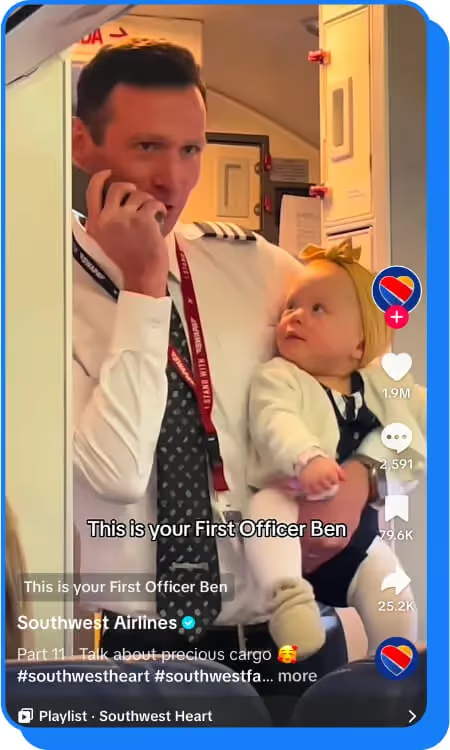
NYC Ferry (@nyc_ferry)
- Average engagement rate: 7.3%
- Average video views: 9.1K
Whether or not you live in New York City, it’s highly likely you’ve been introduced to NYC Ferry-Tok. NYC Ferry does an excellent job of quickly hopping on trends while making them ultra-relevant to its business and audience. They also proudly embrace their city, celebrating local sports wins, attractions like the public library, Broadway and more — this is a great way to attract locals who might want to use the ferry, while also introducing local landmarks to a broader audience.
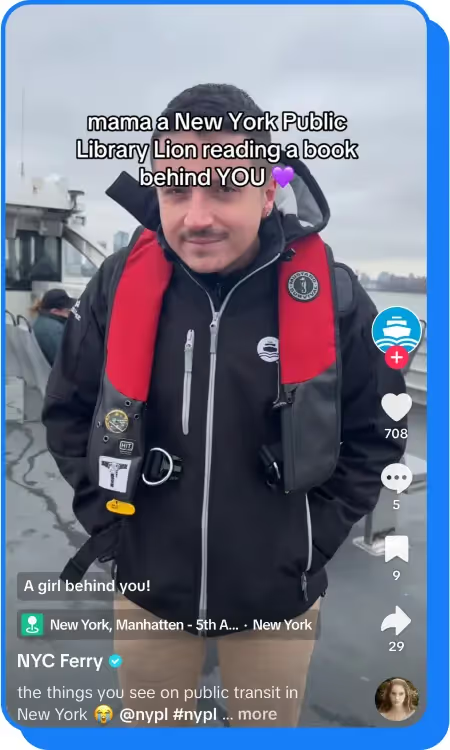
Airbnb (@airbnb)
- Average overall engagement rate: 6.8%
- Average video views: 181.2K
Airbnb taps into celebrities and macro-influencers to promote its variety of properties in it’s ‘Icons’ campaign. ‘Icons’ includes a range of locations, some inspired by beloved Disney movies like a recreation of the ‘Up’ house, or Prince’s iconic ‘Purple Rain’ house featured in his music video — which has never been open to the public before.
They’ve also cleverly partnered with K-pop group Seventeen, to rent the house shown in their music video for the song ‘LOVE, MONEY, FAME’ as an Airbnb location for fans to stay in to garner global appeal and spark travel inspiration for a worldwide audience.
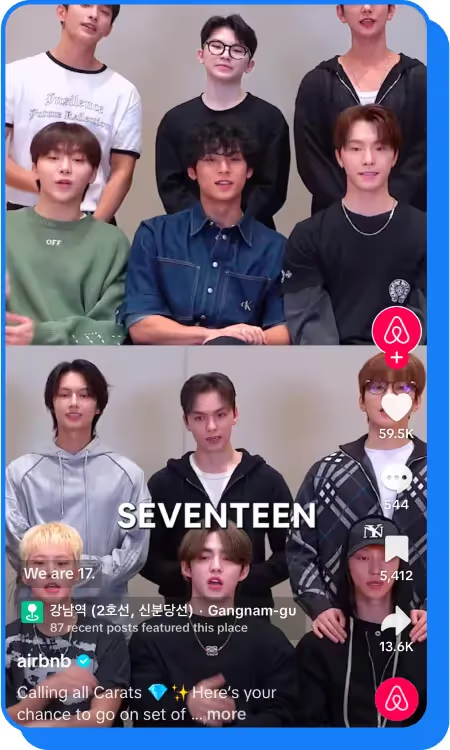
Travel Marketing Tips
Social media marketing in the travel industry has a lot of nuances — in marketing where social media has uncapped reach, quality content allows your brand to be seen by significantly more people. Here are some tips to help you get your strategy organized and navigate these nuances with ease:
1. Know Your Audience
Understanding your target audience is vital in developing effective social media campaigns. Research generational trends, interests and primary motivators for travel and use this information to create content that resonates with them.
Social segmentation is the perfect way to organize your content specifically created for specific audiences, on specific platforms — you can segment audiences by demographics like geography, behavior and psychographic factors like interests and opinion, to closely share and monitor which content results in the most engagement and conversions for these groups.
2. Use Compelling Visuals
Social media is a highly visual medium, so using high-quality, visually appealing images and videos to showcase your travel offerings and paint a portrait of your customer's experience is essential — this is particularly helpful to spark inspiration for exotic locales your online audience might not have considered visiting prior to viewing your content.
Celebrity Cruises is a prime example of a travel brand that leverages its stunning imagery and stories from exotic destinations. Its Reels offer a lavish glimpse into the upscale cruising lifestyle, captivating those dreaming of their next vacation adventure.

3. Share and Engage With UGC
For the travel and hospitality industry, UGC creators are a powerful tool to help users envision themselves in various destinations. In fact, 65% of travelers who planned a trip using social platforms made a purchase based on online content they saw.
While flashy advertisements and curated social posts can seem tempting, it’s important to not underestimate the power of social proof to make a case for an enticing getaway, hotel or local experience.
4. Leverage Influencer Marketing
Creators and influencer marketing are driving brand engagement like never before, with engagements on Instagram seeing a 13% boost and a 46% increase on TikTok in 2024. Strategic creator partnerships are a non-negotiable for brands to succeed on social media and develop meaningful relationships with existing and potential audiences.
One example of a highly successful collaboration was Airbnb, Xbox and influencer Khaby Lame. The trio teamed up to promote a booking at the influencer's gaming pad, leaning into the ‘rest and relaxation’ aspect of tourism that can be easily overlooked in favor of adventure.

5. Tap Into Social Ads
While the industry spends less on social and mobile advertising, it remains crucial for brands to understand what type of content performs well for their audience and what they should be investing its budget in.
Social ads are a great way to repurpose engaging content for similar audiences who might not have seen it organically. This lets your social team work smarter, not harder while minimizing spend on crafting flashy, hi-fi advertisements.
6. Focus on Storytelling
Storytelling is a key element of social media strategy for travel brands and Disney Parks exemplifies this. Built on storytelling, Disney conveys this through its social media channels. Their Instagram captures the magic travelers can expect during their visit.
Ultimately, storytelling is a great way to blend authenticity and persuasion for an organic approach. Studies show that storytelling — particularly when combined with data — help reach audiences emotioanlly and intellectually, and persuade them to take action.
7. Build Community
The shift from a follower growth mindset to a community-building one is key to succeeding on social media. Members of a community are much more active and engaged, stemming from shared interests, two-way relationships and mutual value creation. Travel brands that foster social media communities build stronger customer loyalty, encourage engagement and create opportunities for user-generated content.
8. Hone Your Brand Identity
Your brand identity is your brand DNA. Without a clear identity, there is no brand at all. You might choose to have a funny social media presence to encourage viewers to laugh along with your brand, while some travel brands choose to share crisp, stunning aspirational images that really convey nature's beauty.
United is a great example of a travel brand with a strong online brand identity, reaching over a million followers on Instagram and TikTok. Their social profiles balance humor, relatable memes that poke fun at its brand and the travel experience along with aspirational content that sparks a desire to travel among viewers.
9. Practice Social Media SEO
SEO (search engine optimization) is the process of optimizing your content to be found, and as long as hashtags have been around, social media and SEO have worked hand in hand.
Social media SEO is essential for travel brands as travelers spend a lot of time researching and planning before making a purchase. Optimized content ensures you maximize your chances to reach people, making your brand easy to find while connecting with your audience at the right stage of their journey.
10. Measure Performance — and Adjust
Social analytics and monitoring are crucial for travel brands to measure how organic content performs to inform what content they should put ad spend behind. Social teams pour energy into crafting creative, funny and heartfelt content — while this is a crucial aspect of your visual marketing strategy, setting social media KPIs and goals is, too. Measuring these goals in a timely manner is critical to understand which creative content helps achieve your marketing goals. Measuring your content’s performance, including factors like ROI and engagement metrics like Effectiveness Rate will help determine what content connects with key audiences, what helps achieve your goals and any areas that aren’t working — this also ensures your content doesn’t become stagnant.
Make Every Post a Destination for Engagement With Dash Social
Dash Social features like Predictive Vision AI, Competitors and Dashboards are designed to support social strategies and increase engagement. These features help predict content performance, see what content works for your competitors and monitor analytics to track success.
Along with Creator Management, travel brands can source the best influencers to work with to reach new and existing audiences, boost engagement and diversify their content. Creator and influencer solutions help your team measure the ROI and impact of different creator relationships, determine earned media value and more.
By integrating Dash Social into their workflow, teams can work more efficiently, understand what works and improve their content to boost engagement.
FAQs
Why is marketing important in the travel industry?
The travel industry is highly competitive, so marketing is particularly important because it is how brands can differentiate themselves and boldly proclaim their advantage. Ultimately, customers won’t book trips unless they know about your brand, so building awareness and market share are important.
What are the seven P’s of tourism marketing?
The seven P's of tourism marketing are:
- Product: the travel product or experience being offered.
- Price: the cost of the product or experience.
- Place: the destination or location.
- Promotion: the marketing and advertising used to promote the product or experience.
- People: the staff and customer service representatives involved.
- Process: the procedures and operations.
- Physical evidence: the tangible elements that contribute to the customer's experience, such as accommodation, transportation, and amenities.
What are the five A’s of tourism?
- Attraction: the natural or constructed features that draw in tourists.
- Accommodation: the options for travelers to lodge with.
- Accessibility: the ease with which visitors can reach the destination, which is important to be upfront about.
- Activities: the things to do and see in the destination, including cultural offerings and entertainment.
- Amenities: the services and facilities that enhance the visitor experience, such as shops and restaurants.









